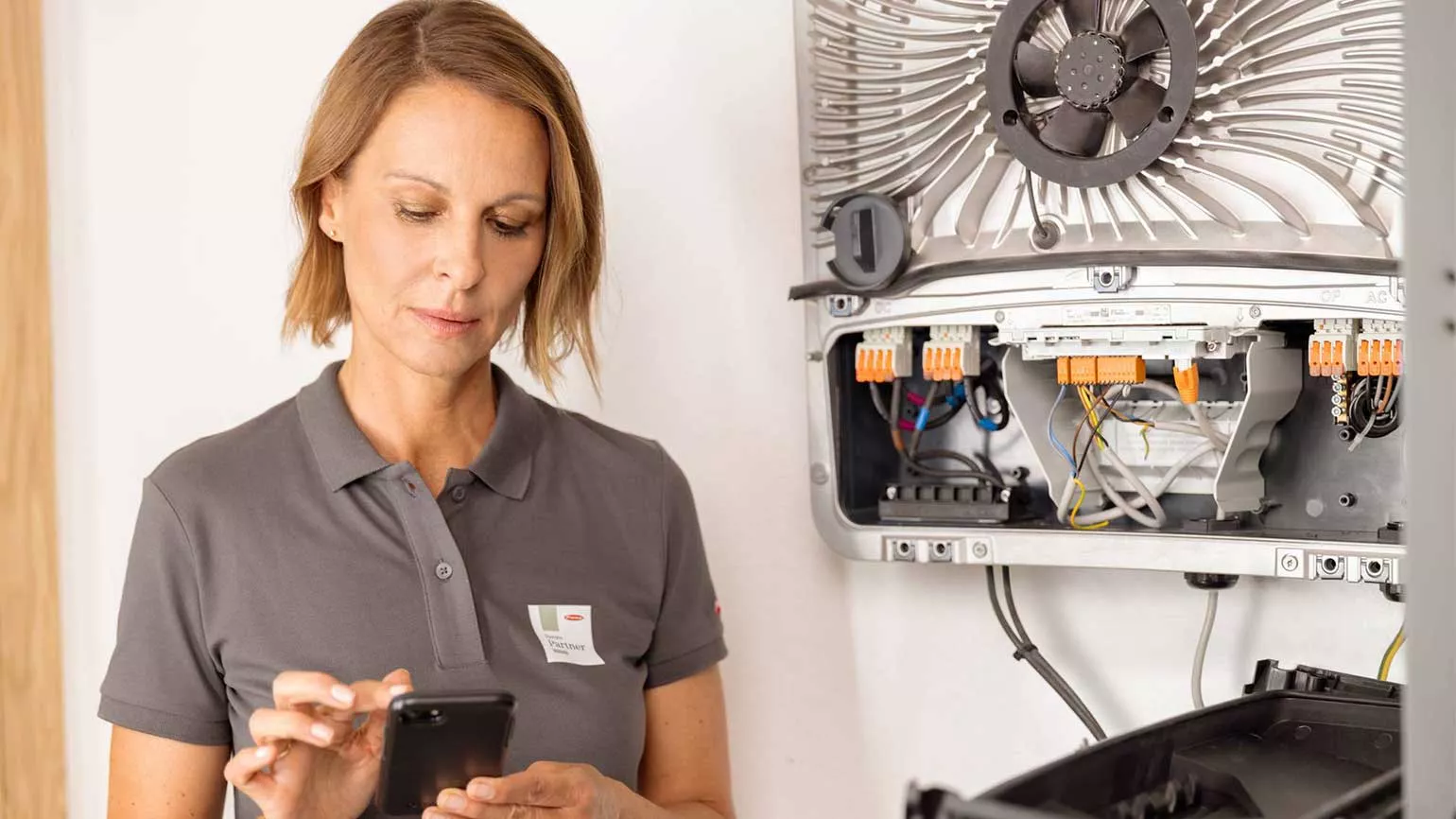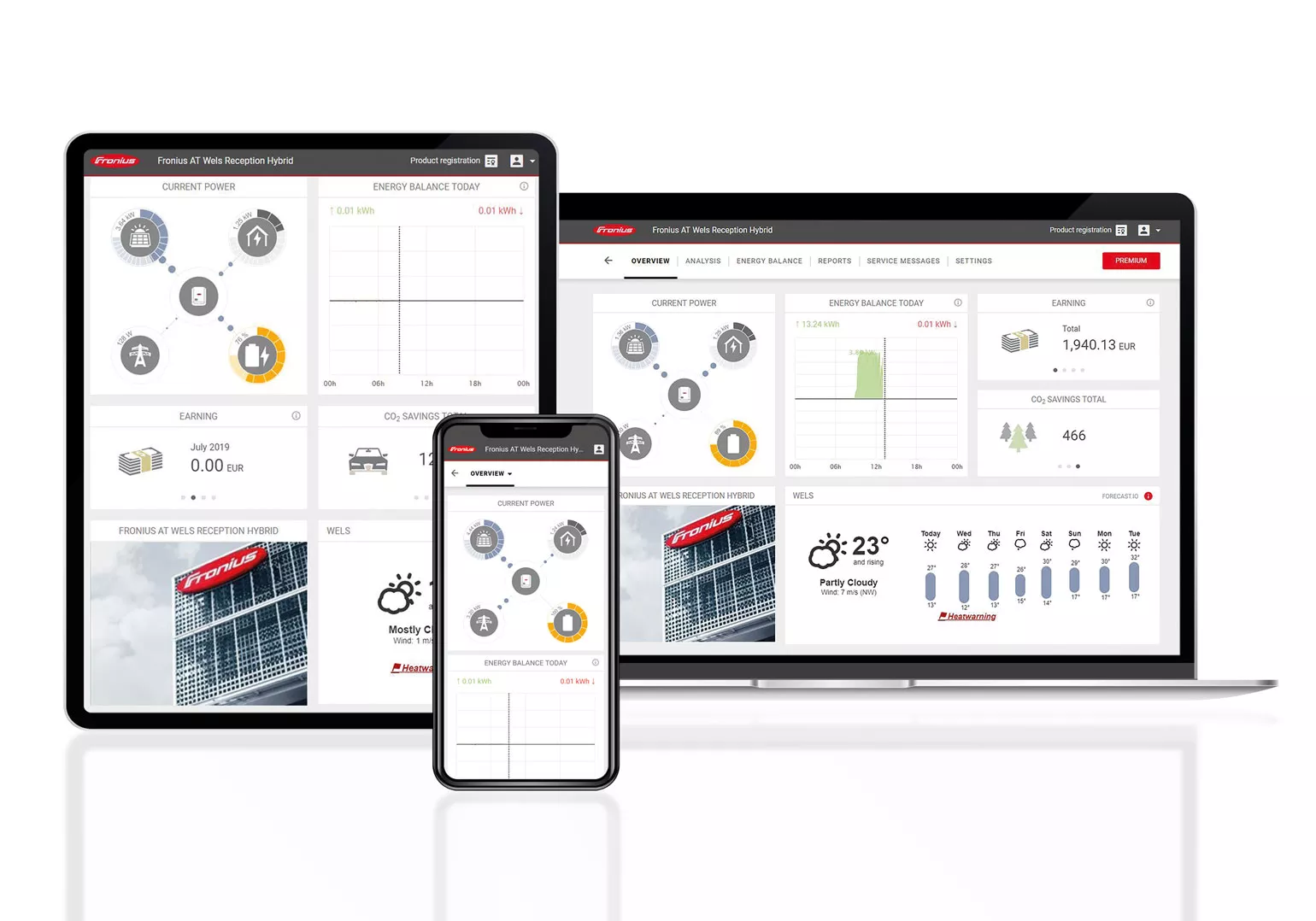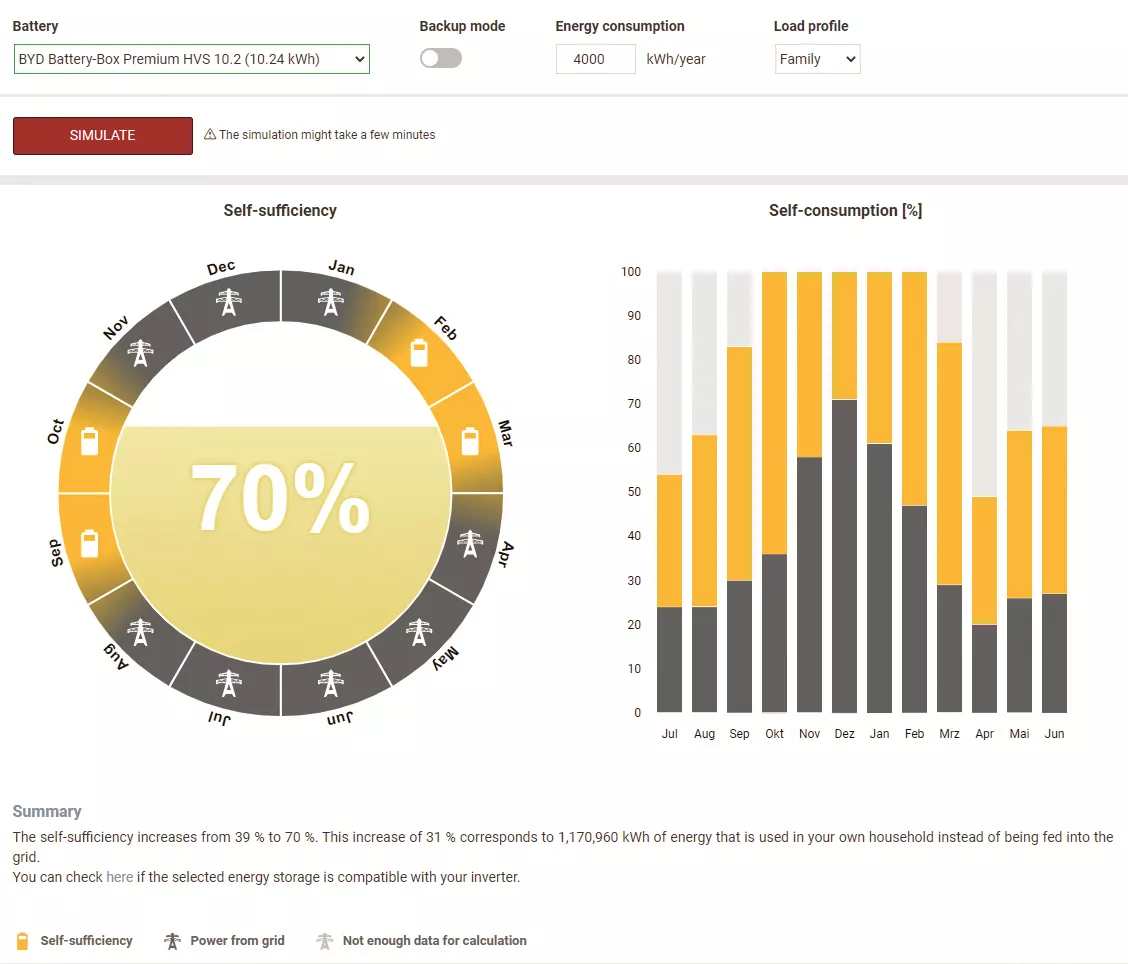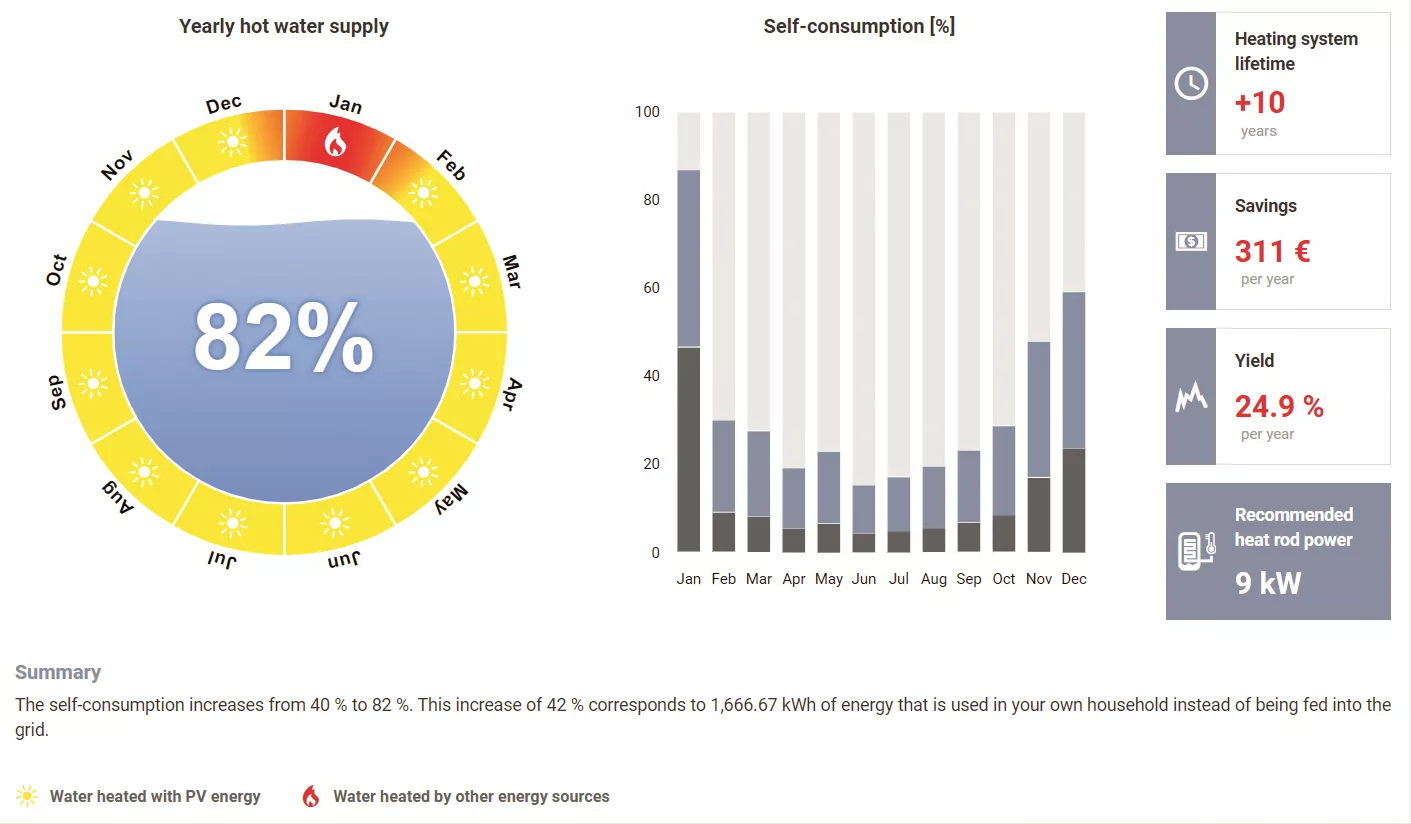7/30/2020
Product
Intelligent energy management and servicing support
Monitoring is essential for
photovoltaic systems and goes far beyond recording production yields. Fronius
Solar.web makes energy flows transparent and enables updates, analyses and
maintenance to be carried out remotely. Installers can prepare in the best way
possible for every customer appointment and impress with a high quality of
service. The energy management tool now offers two new features to maximise the
rate of self-consumption and degree of autonomy: it demonstrates the advantages
of water heating and battery storage based on the system operator’s own actual
data.

The particular strength of Solar.web is
presenting energy flows clearly and comprehensibly. These can be called up
conveniently on a smartphone, tablet or computer. On the well-structured
dashboard, system operators always have an overview of the yield and
consumption values of their PV system – either in real time or as monthly and
seasonal figures. The overview is supplemented by an amortisation display, the
cumulative CO2 savings and a 48-hour yield forecast1
based on the weather forecast. If applicable, the battery charge status and
water heating are also displayed. In combination with a Fronius Smart Meter as
a bidirectional consumption meter, customers can see how much electricity they
produce, consume, feed into the grid or obtain from it. This balance indicates
how much potential is still available for self-consumption or storage.
“We equip all our products with the appropriate hardware for optimal system monitoring and provide our energy management tool free of charge. As soon as a PV system is online, it’s ready to track. Firstly, it’s important to us that homeowners understand the energy flows of their PV system, as this enables them to maximise their rate of self-consumption. Secondly, installers should be able to offer the best service and comprehensive energy consultation. This is how our vision of 24 hours of sun, or a world that covers 100% of its energy needs from renewable sources, becomes a reality,” emphasises Leonhard Peböck, Product Marketer at Fronius International.
Efficiency and one-stop solution expertise
Installers and system owners benefit if the PV system is registered and brought online on Solar.web as soon as it is commissioned, because it is the foundation on which a customer relationship characterised by good experiences is built. Solar.web supports customer care and minimises service costs: automatic fault notification enables rapid troubleshooting, technical analyses can be carried out in no time at all and regular updates or minor service tasks are handled remotely. This proactive service saves the technician time and travel costs. If an on-site visit is nevertheless necessary, rapid fault analysis, clear reports and status messages help installers prepare in the best way possible and plan routes efficiently. With the right components and the appropriate solution at their disposal, a Fronius System Partner (FSP) can handle almost any service visit with a single appointment. This results in satisfied customers, because they can be sure that they and their PV system are well looked after.
Optimising self-consumption with yield in mind
Solar.web allows installers to support their customers during their personal energy revolution. By cleverly shifting energy consumption to times when PV production is sufficient, customers can noticeably increase their electricity utilisation. Installers can score top marks by giving their customers good tips and advice. How the potential of a PV system can be exploited to the full is made visible on the basis of yield analyses, performance checks and target/actual comparisons down to MPP tracker level. For example, system operators can consume their surplus electricity themselves, using it to operate a heat pump or storing it to use at night. The PV system can be expanded and upgraded step-by-step; even the leap to charging an electric car is no longer out of reach. Fronius inverters are ideally suited to this as they provide numerous interfaces for energy sector integration.
Making potential visible to the customer
“Solar.web now features simulation options that can be used to present clever system expansions. At the click of a button, they show system operators how their rate of self-consumption could be increased with battery storage or the Fronius Ohmpilot, and what this would mean in monetary terms. The production and consumption analyses2, i.e. the actual measured values of the customer’s system, provide the basis for this,” says Thomas Obermüller, Fronius Digital Business Solutions, on the new energy sector integration features.
A PV system that is online on Solar.web is all that is needed. In just a few clicks, the Ohmpilot simulation shows how the surplus solar power can be used to heat water. This reduces heating costs, replaces fossil fuels and extends the service life of the primary heating system by many years. The battery simulation is just as simple. It allows the user to select different battery types and storage capacities and shows in a graph how self-sufficiency and PV self-consumption increase.
1Feature of Fronius Solar.web Premium
2The PV system must be online for at least 1 month for sufficient real-time values to be provided as a basis for simulation
You can find more information about Solar.web and various demo systems at www.solarweb.com
“We equip all our products with the appropriate hardware for optimal system monitoring and provide our energy management tool free of charge. As soon as a PV system is online, it’s ready to track. Firstly, it’s important to us that homeowners understand the energy flows of their PV system, as this enables them to maximise their rate of self-consumption. Secondly, installers should be able to offer the best service and comprehensive energy consultation. This is how our vision of 24 hours of sun, or a world that covers 100% of its energy needs from renewable sources, becomes a reality,” emphasises Leonhard Peböck, Product Marketer at Fronius International.
Efficiency and one-stop solution expertise
Installers and system owners benefit if the PV system is registered and brought online on Solar.web as soon as it is commissioned, because it is the foundation on which a customer relationship characterised by good experiences is built. Solar.web supports customer care and minimises service costs: automatic fault notification enables rapid troubleshooting, technical analyses can be carried out in no time at all and regular updates or minor service tasks are handled remotely. This proactive service saves the technician time and travel costs. If an on-site visit is nevertheless necessary, rapid fault analysis, clear reports and status messages help installers prepare in the best way possible and plan routes efficiently. With the right components and the appropriate solution at their disposal, a Fronius System Partner (FSP) can handle almost any service visit with a single appointment. This results in satisfied customers, because they can be sure that they and their PV system are well looked after.
Optimising self-consumption with yield in mind
Solar.web allows installers to support their customers during their personal energy revolution. By cleverly shifting energy consumption to times when PV production is sufficient, customers can noticeably increase their electricity utilisation. Installers can score top marks by giving their customers good tips and advice. How the potential of a PV system can be exploited to the full is made visible on the basis of yield analyses, performance checks and target/actual comparisons down to MPP tracker level. For example, system operators can consume their surplus electricity themselves, using it to operate a heat pump or storing it to use at night. The PV system can be expanded and upgraded step-by-step; even the leap to charging an electric car is no longer out of reach. Fronius inverters are ideally suited to this as they provide numerous interfaces for energy sector integration.
Making potential visible to the customer
“Solar.web now features simulation options that can be used to present clever system expansions. At the click of a button, they show system operators how their rate of self-consumption could be increased with battery storage or the Fronius Ohmpilot, and what this would mean in monetary terms. The production and consumption analyses2, i.e. the actual measured values of the customer’s system, provide the basis for this,” says Thomas Obermüller, Fronius Digital Business Solutions, on the new energy sector integration features.
A PV system that is online on Solar.web is all that is needed. In just a few clicks, the Ohmpilot simulation shows how the surplus solar power can be used to heat water. This reduces heating costs, replaces fossil fuels and extends the service life of the primary heating system by many years. The battery simulation is just as simple. It allows the user to select different battery types and storage capacities and shows in a graph how self-sufficiency and PV self-consumption increase.
1Feature of Fronius Solar.web Premium
2The PV system must be online for at least 1 month for sufficient real-time values to be provided as a basis for simulation
You can find more information about Solar.web and various demo systems at www.solarweb.com




